XistentialAngst's Blog, page 205
January 2, 2016
Mary is the final bride/Moriarty?
Has anyone gone through this yet? Because the fact that Mary didn’t get to be a bride on screen has been plaguing me for the last 24 hours.
Sherlock has that moment at the end, before Moriarty raises the veil, where he’s mirroring that moment in His Last Vow.
Mary is the only one of the women that we didn’t get to see as the bride–and we know Lady Carmichael didn’t kill her own husband because she was literally in the room with Sherlock when John saw the bride, yes? Sherlock assumes later that it was Molly who climbed out the window–but why couldn’t that have been Mary?
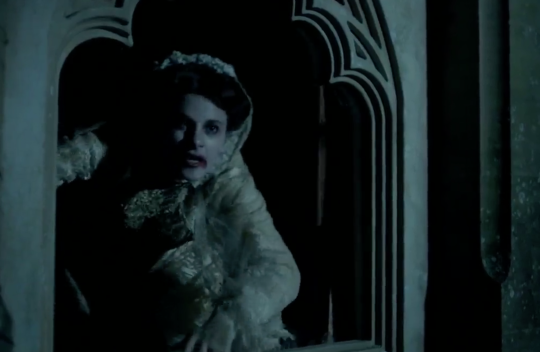
That particular bride even crops up scaring John in the editing when Sherlock’s “the women we have lied to, betrayed, ignored” line is delivered. John and the bride are on screen for “ignored.” Who has John been ignoring?
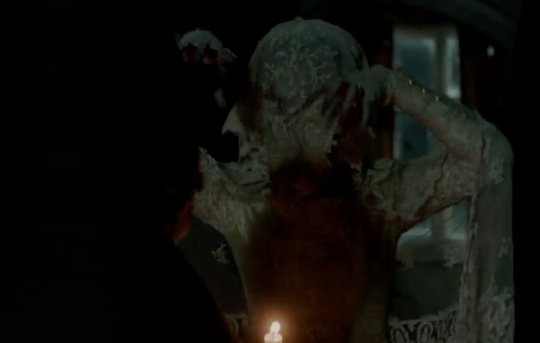
The fact that there was a “Miss me?” note on the corpse would support this theory, as well, if you’re of the belief that Mary is the “new” Moriarty. None of the other corpses had notes–why this one, if it wasn’t someone trying to send a message to Sherlock Holmes? (Like the Study in Pink suicides, there was only one note–and it was the one that started Sherlock on the path to Moriarty.)
So Sherlock is asking the Moriarty-bride, who has come specifically out to see him, why she engaged him in the case when she intended to commit the murder herself. He’s so sure it’s Lady C., but at the same time, he’s confused–he says it doesn’t make sense.
And the way he delivers this line is very similar to his delivery of the Lady Smallwood line in HLV. His reaction is similar, as well–he’s shocked. He says explicitly “It can’t be you.” He’s thrown the same way he was when Mary turned around and revealed herself as the person training a gun on Magnussen. Then that string of his mind palace starts to come undone and he “wakes up.”
But Sherlock’s subconscious is starting to put it together–it had to be Moriarty who committed the murder, but not Moriarty as Sherlock knows him.
Even when Sherlock starts to “wake up,” Moriarty’s line “You’re dreaming” is immediately said by Mary. Sherlock’s brain is connecting Mary to Moriarty–especially given the fact that we now know he was still in the mind palace when he heard Mary/Moriarty say “You’re dreaming.”
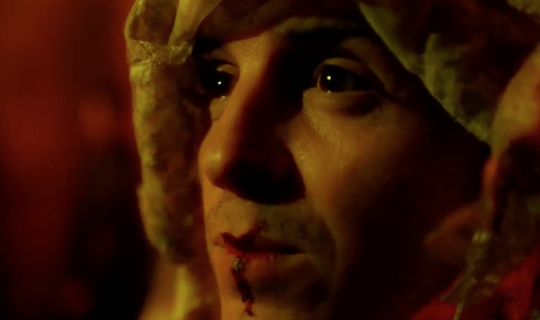
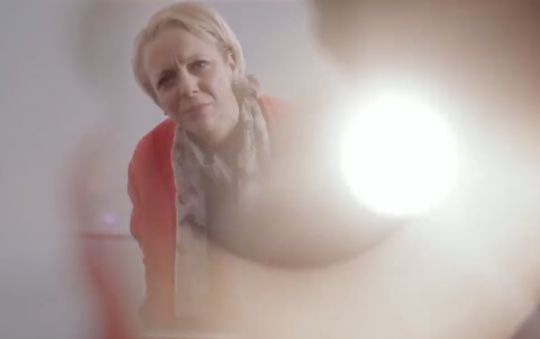
None of it makes sense to his brain because Moriarty is the “virus in the data.” He’s infiltrating in places where Sherlock’s brain seems too afraid to actually see the truth, the same way Sherlock saw Moriarty in Hound. Almost all the other episodes had direct parallels in this one, but Hound didn’t get one beyond the short mention at the beginning (”the dog one”) and the “once you’ve eliminated the impossible” bit with the ghost. But in Hound, Sherlock saw Moriarty in place of the scientist fellow whose name I can’t remember.
Here, he sees Moriarty in place of Mary.
And then, just like in Hound, he blinks it away and sees the person he’s meant to see. Sherlock “wakes up” and sees Mary.
I’m going to agonize over this for the next year, aren’t I?
I think you should be really proud of this, actually. Nicely done.
Yes, great point. Totally agree.
Redbeard was the other brother. At a young age, Sherlock was responsible for his death. This is the root of his trauma.
:
Okay, the first part of this is pretty widely accepted, or at least frequently discussed. The level of Sherlock’s dysfunction is way too severe to be triggered by the death of a childhood pet, no matter how attached Sherlock may have been.
But, a sibling. Specifically, a brother, for reasons that will soon be clear.
Let’s go back to the wedding, and the first mention of Redbeard.
“Don’t get involved,” Mycroft says. “Do you remember…Redbeard?”
“I’m not a child,” Sherlock snaps.
Whatever transpired with Redbeard and Sherlock happened at a very young age.
Then in HLV, several key exchanges take place.
When Sherlock is shot, he seeks refuge in his mind palace…specifically, looking for something to comfort him, in order to not go into shock.
Mary blocks his path to John.
So he goes looking for…Redbeard. A stereotypical, picture-perfect red Irish setter. The thought of a dog, all love and loyalty and soft fur, comforts Sherlock in a time of great trauma.
(“I know a mind palace,” says Mycroft in TAB. “I know what it can and cannot do.”–Paraphrased, sorry , I’m in a shitty Denny’s in Woodbridge VA and I’m exhausted. Remember this, it is important.)
Later in HLV, Mummy Holmes says, “If I find out who put a bullet in my boy, I shall turn monstrous.”
And after Sherlock shoots Magnussen, he drops the gun and puts up his hands…and we see him, through Mycroft’s eyes, as a sobbing child of perhaps twelve.
“Oh, Sherlock,” he says.
“What have you done?”
I humbly submit that this image of Sherlock as a child is telling us that this is somewhere that both of them have been before, emotionally. That what we see, through Mycroft’s eyes– his brother as a devastated, sobbing child– has happened before.
So what am I saying here?
I believe Sherlock caused his sibling’s death, almost certainly inadvertently, through some sort of accident or misadventure or cleverness gone terribly wrong.
Mycroft is the only one who knows.
Mycroft covered it up, somehow took responsibility for what happened.
Their parents do not know, because if Mummy were to find out, she would turn monstrous against Sherlock. This is why “Mycroft has a file. I have a list.”
This tragedy, compounded with guilt and secrecy and lies. largely why such a (seemingly nice) family is so clearly estranged from their very messed up youngest son.
Importantly, Sherlock likely doesn’t consciously recognize the truth of his trauma. I wonder if Mycroft somehow planted the idea of Redbeard as a post-hypnotic suggestion, a desperate attempt to try and alleviate a young Sherlock’s devastating anguish.
This is what “upset Mummy.” This is why Sherlock is both dependent upon and horrendously, hatefully resentful of Mycroft. This is why Sherlock has a longstanding, still-raging drug habit and lives in a more or less constant state of suicidal ideation.
This is why Sherlock hates himself, and believes he is both incapable and unworthy of love. This is why Sherlock believes he has to be alone.
I wonder If this is the leverage, the family history Moriarty (Mary) has on Sherlock, the information that Mycroft is trying desperately to keep hidden because he fears it would destroy a desperately fragile Sherlock.
“I was just a kid,” he says in The Great Game. That line always struck me as a bit odd, a bit defensive, a bit fearful.
He was just a kid.
But in Mycroft’s blind, heedless, unconditional love and protection of Sherlock, he has made everything so, so, so,much worse. It’s the lies that destroy us, in the end, and this huge lie at the center of both of their lives is the wellspring of all their misery.
To paraphrase David Foster Wallace, the truth will set them free, but not until it is finished with them.
And Sherlock is finally ready to be free. With John at his side, he has set his feet on the path of freedom and self-forgiveness.
But I suspect, in the end, the price to be paid will be terrible for the Holmes Brothers.
My heart is breaking for both of them.
(Additional observaions, theories, gifsets are absolutely, positively more than welcome. Like I said, I’m stuck in a crappy diner and exhausted. But I really truly feel there is something to this.)
Very interesting theory. It would certainly explain why Redbeard is such a big deal, and it would make sense that they have some twists left in the Redbeard story (of course they do).
“You may however, rest assured that there are no ghosts in this world…save those we make for ourselves”
ALSO! Lord Carmichael is a mirror for Sherlock. After Lord Carmichael refuses to cooperate with Sherlock and Sherlock and John are leaving. Sherlock says “
Hard
to say what he’ll do. Guilt is eating away at his soul. Something in his past.
The orange pips were a reminder.” This may be the secret guilt in Sherlock’s past.
He goes on to say: “We all have a past. Ghosts, shadows that
defines our every sunny day.” Then he says that Carmichael fears something “worse than death" he fears he’s
to be “dragged to hell by the corpse of the late mrs. Rigoletti”. So does
Sherlock fear ‘worse than death’, he fears ‘being dragged to hell’ – possibly emotional pain, if he were to let someone close again? Or possible he fears the emotional pain threatened by the bride (i.e. Mary).
emilociraptor:
I cannot believe that, in the same episode that later establishes revolvers as a...
I cannot believe that, in the same episode that later establishes revolvers as a symbol for dicks with the image of moriarty committing suicide by blowjob, john asks sherlock if he’s a virgin and sherlock says, and I quote, “pass me your revolver, I have a sudden need to use it”
I cannot believe this!
Yes, and he says pass me YOUR revolver I have a sudden need to USE if, not ‘a revolver’ not ‘shoot myself’ or ‘kill myself’ but USE it.
recentlyfolded:
thememacat:
incurablylazydevil:
Moriarty is...
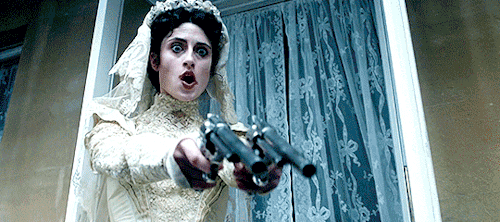

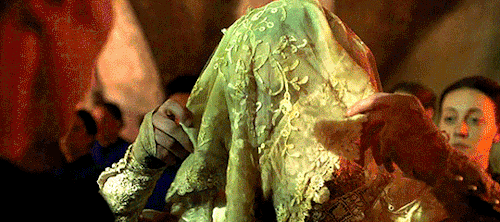
Moriarty is dead. No question. More importantly, I know exactly what he’s going to do next.
How does a dead man do anything next?
Precisely! So if Moriarty is internalized to Sherlock’s (crappy) sense of self, then Sherlock is dissociating to an interesting extent. Or he could simply mean that he knows where Moriarty’s influence will crop up next. Which is your cue, Mary and Janine.
If the Emilia story is a Moriarty mirror, then possibly one or more of these may be the case:
1. Moriarty was always Mary; the Andrew Scott Moriarty was just a front from the start.
2. Moriarty and Mary are twins? We don’t know Mary’s actual birth identity.
3. Moriarty was actually Andrew Scott, but now that he’s gone, Mary (his second on command) assumes the identity of Moriarty like a Dread Pirate Roberts thing and like the women can all now “be” the abominable bride.
Redbeard was the other brother. At a young age, Sherlock was responsible for his death. This is the root of his trauma.
:
Okay, the first part of this is pretty widely accepted, or at least frequently discussed. The level of Sherlock’s dysfunction is way too severe to be triggered by the death of a childhood pet, no matter how attached Sherlock may have been.
But, a sibling. Specifically, a brother, for reasons that will soon be clear.
Let’s go back to the wedding, and the first mention of Redbeard.
“Don’t get involved,” Mycroft says. “Do you remember…Redbeard?”
“I’m not a child,” Sherlock snaps.
Whatever transpired with Redbeard and Sherlock happened at a very young age.
Then in HLV, several key exchanges take place.
When Sherlock is shot, he seeks refuge in his mind palace…specifically, looking for something to comfort him, in order to not go into shock.
Mary blocks his path to John.
So he goes looking for…Redbeard. A stereotypical, picture-perfect red Irish setter. The thought of a dog, all love and loyalty and soft fur, comforts Sherlock in a time of great trauma.
(“I know a mind palace,” says Mycroft in TAB. “I know what it can and cannot do.”–Paraphrased, sorry , I’m in a shitty Denny’s in Woodbridge VA and I’m exhausted. Remember this, it is important.)
Later in HLV, Mummy Holmes says, “If I find out who put a bullet in my boy, I shall turn monstrous.”
And after Sherlock shoots Magnussen, he drops the gun and puts up his hands…and we see him, through Mycroft’s eyes, as a sobbing child of perhaps twelve.
“Oh, Sherlock,” he says.
“What have you done?”
I humbly submit that this image of Sherlock as a child is telling us that this is somewhere that both of them have been before, emotionally. That what we see, through Mycroft’s eyes– his brother as a devastated, sobbing child– has happened before.
So what am I saying here?
I believe Sherlock caused his sibling’s death, almost certainly inadvertently, through some sort of accident or misadventure or cleverness gone terribly wrong.
Mycroft is the only one who knows.
Mycroft covered it up, somehow took responsibility for what happened.
Their parents do not know, because if Mummy were to find out, she would turn monstrous against Sherlock. This is why “Mycroft has a file. I have a list.”
This tragedy, compounded with guilt and secrecy and lies. largely why such a (seemingly nice) family is so clearly estranged from their very messed up youngest son.
Importantly, Sherlock likely doesn’t consciously recognize the truth of his trauma. I wonder if Mycroft somehow planted the idea of Redbeard as a post-hypnotic suggestion, a desperate attempt to try and alleviate a young Sherlock’s devastating anguish.
This is what “upset Mummy.” This is why Sherlock is both dependent upon and horrendously, hatefully resentful of Mycroft. This is why Sherlock has a longstanding, still-raging drug habit and lives in a more or less constant state of suicidal ideation.
This is why Sherlock hates himself, and believes he is both incapable and unworthy of love. This is why Sherlock believes he has to be alone.
I wonder If this is the leverage, the family history Moriarty (Mary) has on Sherlock, the information that Mycroft is trying desperately to keep hidden because he fears it would destroy a desperately fragile Sherlock.
“I was just a kid,” he says in The Great Game. That line always struck me as a bit odd, a bit defensive, a bit fearful.
He was just a kid.
But in Mycroft’s blind, heedless, unconditional love and protection of Sherlock, he has made everything so, so, so,much worse. It’s the lies that destroy us, in the end, and this huge lie at the center of both of their lives is the wellspring of all their misery.
To paraphrase David Foster Wallace, the truth will set them free, but not until it is finished with them.
And Sherlock is finally ready to be free. With John at his side, he has set his feet on the path of freedom and self-forgiveness.
But I suspect, in the end, the price to be paid will be terrible for the Holmes Brothers.
My heart is breaking for both of them.
(Additional observaions, theories, gifsets are absolutely, positively more than welcome. Like I said, I’m stuck in a crappy diner and exhausted. But I really truly feel there is something to this.)
Very interesting theory. It would certainly explain why Redbeard is such a big deal, and it would make sense that they have some twists left in the Redbeard story (of course they do).
williamanyascottholmes:
oh shiiiiiiiit
Yes!
recentlyfolded:
thememacat:
incurablylazydevil:
Moriarty is...



Moriarty is dead. No question. More importantly, I know exactly what he’s going to do next.
How does a dead man do anything next?
Precisely! So if Moriarty is internalized to Sherlock’s (crappy) sense of self, then Sherlock is dissociating to an interesting extent. Or he could simply mean that he knows where Moriarty’s influence will crop up next. Which is your cue, Mary and Janine.
Love these visual parallels
January 1, 2016
Did Sherlock want to elope with John on the stag night?
It seems that Sherlock might have relived a more preferable version of the stag night in the Victorian mindpalace waterfall scene.
John slips a bit from his chair and finally touches Sherlock’s knee.
JOHN: I don’t mind.
SHERLOCK: Me too.
[…]
JOHN: Am I a woman? […] Am I pretty?
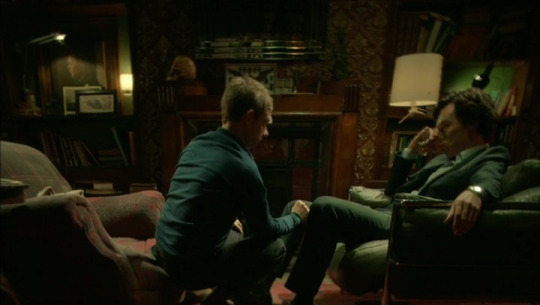
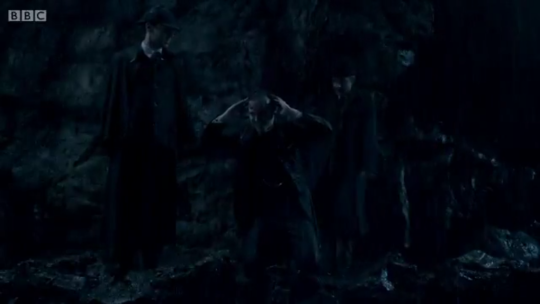
WATSON: So what’s he like - the other me, in the other place?
HOLMES: Smarter than he looks.
WATSON: Pretty damn smart then.
HOLMES: Pretty damn smart. (*suggestive smile*)
MORIARTY: Ugh - Why don’t you two just elope, for god’s sake!
WATSON: Impertinant.
HOLMES: Offensive.
WATSON: Actually, would you mind?
HOLMES: Not at all.
Then Watson kicks Moriarty down the waterfall.
He kicks down Moriarty, the allegory of Sherlock’s inner demons that were keeping him from openly falling (in love) with John. John kills of Sherlock’s fears and Sherlock falls, while John is watching and supporting this decision.
He would have eloped with John on the stag night. But he couldn’t fight his Moriarty-demons on his own. He needed John’s help for this.
Nice interpretation.
"…I wrote all that. You’re quoting yourself from the Strand Magazine. Those are my words, not yours...."
- John Watson, The Abominable Bride (via dramatisecho)
The one big disappointment I have with the special is that Mary is still there. I was hoping her...
The one big disappointment I have with the special is that Mary is still there. I was hoping her villanry would be confirmed in the special–such as her being revealed as the ‘abominable bride’. After all, this is Sherlock’s mind palace and SHE”S the big threat in more ways than one. I sort of expected him to reach some horrible conclusion about her (such as her being Moriarty’s right hand man).
But that didn’t happen. Throughout she was portrayed simply as John’s wife (and a spy for Mycroft, but not in a bad way). Ugh. It’s like she never shot Sherlock. That wasn’t even in the special–what it’s not as important as John meeting Sherlock, the Hound, etc? To Sherlock himself? That doesn’t even make sense. If this is his mind palace, she should have had a much more ominous role.
I’m so ready for her to be gone. She’s already been WAY more in BBC Sherlock than in the ACD canon or probably any other Sherlock interpretation. Makes me fearful for S4.
I hope they’re not keeping her around merely to combat the ‘gayness’ of the show. See! John is straight! gag me.
XistentialAngst's Blog
- XistentialAngst's profile
- 15 followers






